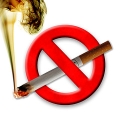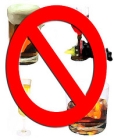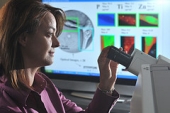Cut Your Cancer Risk
 Precautions To Reduce The Risk Of Cancer:
Precautions To Reduce The Risk Of Cancer:
Step 1. Eat Healthy: Though making healthy selections and buying good products at the grocery store and at mealtime cannot guarantee you wont get cancer, it may help reduce your risk. Eat an abundance of foods from plant-based sources. Eat five or more servings of fruits and vegetables each day. In addition, eat other foods from plant sources, such as whole grains and beans, several times a day. Replacing high-calorie foods in your diet with fruits and vegetables may help you lose weight or maintain your weight. A diet high in fruits and vegetables has been linked to a reduced risk of cancers of the colon, esophagus, lung and stomach. Limit fat. Eat lighter and leaner by choosing fewer high-fat foods, particularly those from animal sources. High-fat diets tend to be higher in calories and may increase the risk of overweight or obesity, which can, in turn, increase cancer risk. Drink alcohol in limit, if at all. Your risk of cancers, including mouth, throat, esophagus, kidney, liver and breast cancers, increases with the amount of alcohol you drink and the length of time you’ve been drinking regularly. Even a moderate amount of drinking — two drinks a day if you’re a man or one drink a day if you’re a woman, and one drink a day regardless of your sex if you’re over 65 — may increase your risk.
 Step 2. Exercise Regularly: Stay active and maintain a healthy weight. Maintaining a healthy weight and exercising regularly also may play a role in cancer prevention. Being overweight or obese may increase your risk of cancers of the breast, colon, esophagus, kidney, stomach and uterus. Physical activity can help you avoid obesity by controlling your weight. Physical activity on its own may also lower your risk of cancers of the breast, colon, prostate and uterus. Try to be physically active for 30 minutes or more on most days of the week. Once you achieve that goal, adding more exercise to your day may reduce your risk of certain cancers further. Your exercise sessions can include such low-key activities as brisk walking, raking the yard or even ballroom dancing. Safe exercise programs are available for just about everyone. Your doctor or physical therapist can help design one for you.
Step 2. Exercise Regularly: Stay active and maintain a healthy weight. Maintaining a healthy weight and exercising regularly also may play a role in cancer prevention. Being overweight or obese may increase your risk of cancers of the breast, colon, esophagus, kidney, stomach and uterus. Physical activity can help you avoid obesity by controlling your weight. Physical activity on its own may also lower your risk of cancers of the breast, colon, prostate and uterus. Try to be physically active for 30 minutes or more on most days of the week. Once you achieve that goal, adding more exercise to your day may reduce your risk of certain cancers further. Your exercise sessions can include such low-key activities as brisk walking, raking the yard or even ballroom dancing. Safe exercise programs are available for just about everyone. Your doctor or physical therapist can help design one for you.
 Step 3. Stop Smoking: Lung cancer is responsible for a quarter of cancer deaths in the UK, and 80% of lung cancer cases are smoking related. Stopping smoking greatly cuts the risk of developing cancer. The earlier you stop, the greater the impact. But it’s never too late to quit. People who quit smoking at the age of 30 live nearly as long as non-smokers, and those who quit at 50 can still undo half the damage.
Step 3. Stop Smoking: Lung cancer is responsible for a quarter of cancer deaths in the UK, and 80% of lung cancer cases are smoking related. Stopping smoking greatly cuts the risk of developing cancer. The earlier you stop, the greater the impact. But it’s never too late to quit. People who quit smoking at the age of 30 live nearly as long as non-smokers, and those who quit at 50 can still undo half the damage.
Step 4. Protect Yourself From The Sun: Taking care in the sun so that you don’t get burned is an important way of preventing skin cancer. Try to spend time in the shade between 11am and 3pm. Make sure you never burn and always use factor 15+ sunscreen. Always cover up with a T-shirt, hat and sunglasses. Remember to take care with children. Try to avoid exposure to the heat, especially in summer time by wearing clothes which cover your hands and legs.
 Step 5. Avoid Alcohol: Alcohol causes an estimated 2,000 cases of breast cancer a year and is linked to cancer of the liver, mouth, foodpipe and lung. It’s important to have alcohol-free days, and when you do drink, sip your drinks slowly and alternate them with soft drinks. Drinking four or more units of alcohol a day increases your risk of mouth cancer. When you drink heavily, every additional drink increases your risk even more.
Step 5. Avoid Alcohol: Alcohol causes an estimated 2,000 cases of breast cancer a year and is linked to cancer of the liver, mouth, foodpipe and lung. It’s important to have alcohol-free days, and when you do drink, sip your drinks slowly and alternate them with soft drinks. Drinking four or more units of alcohol a day increases your risk of mouth cancer. When you drink heavily, every additional drink increases your risk even more.
Step 6. Reduce Weight: Maintaining a healthy weight and exercising regularly also may play a role in cancer prevention. Being overweight or obese may increase your risk of cancers of the breast, colon, esophagus, kidney, stomach and uterus. Physical activity can help you avoid obesity by controlling your weight. Physical activity on its own may also lower your risk of cancers of the breast, colon, prostate and uterus.
 Can Cancer Be Cured:
Can Cancer Be Cured:
The answer is yes, cancer is curable in the case of some people. More than 80% of people suffering from cancer are completely curable if treated early. People have been successfully cured of cancer and there has been no recurrence of it in the next five years and above, making the chances of it reappearing very rare. A person who has suffered from cancer should get himself checked every half yearly to take precautions. For any type of cancer to be curable, a person must take care of three factors. The type of cancer that person has, the stage in which the cancer has proceeded and how well the patient responds to the treatment that is given to him, are the most important factors. If cancer is diagnosed early, there are many chances of survival for the patient. If it is a tumor in the breast or bowel, then it can be operated and the tumor can be removed, then the patient has all the chances of recovery. But if the tumor is not restricted and has spread to the other parts of the body, then also the cancer cells are destroyed by way of chemotherapy. There are some types of cancers which can be cured even after they have spread like Childhood leukemia, Hodgkin’s disease, Large cell Lymphoma, APL Testicular Cancer, Choriocarcinoma Cancer. Different types of cancer have different types of cures.